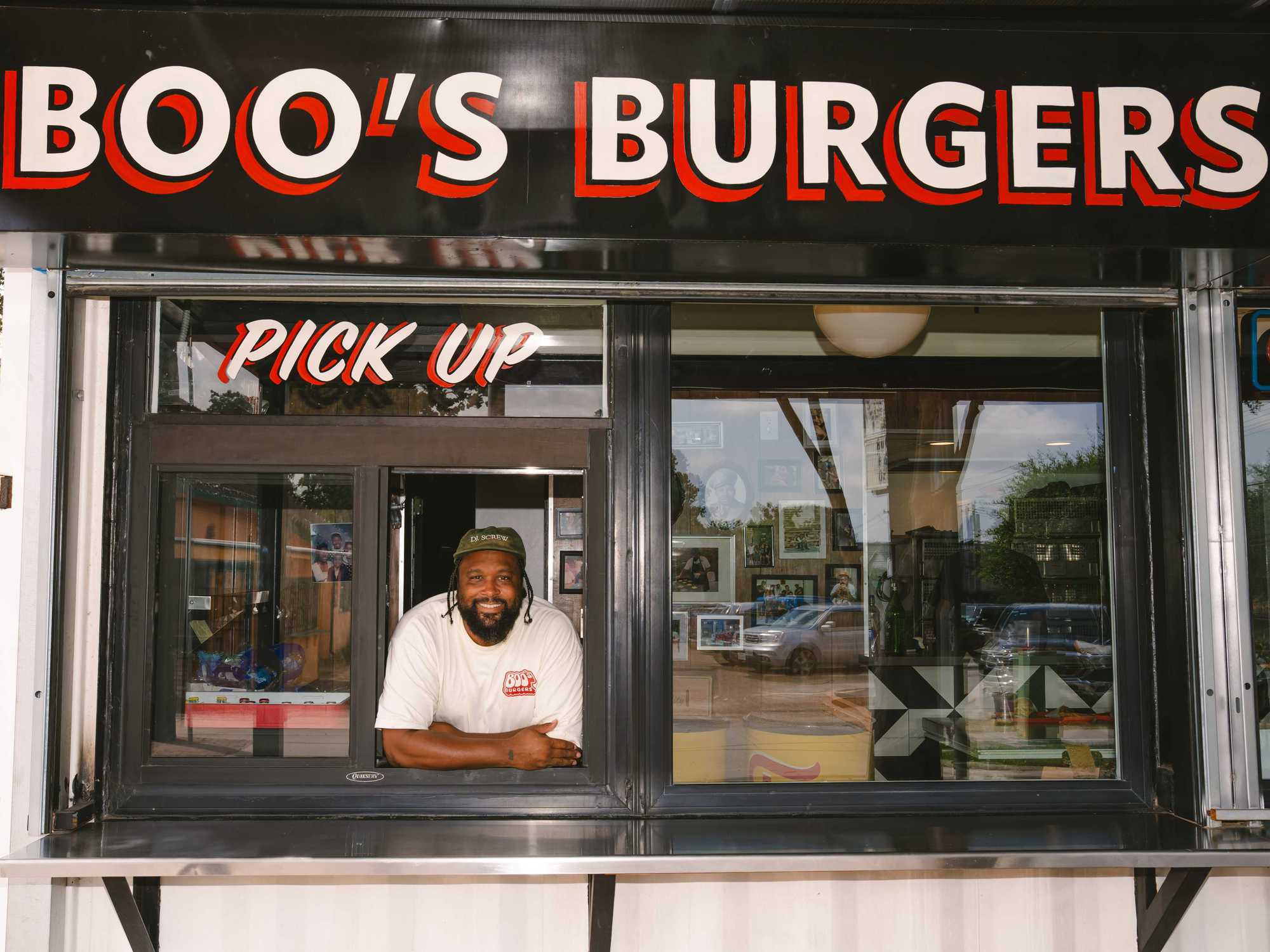Balanced documentary
The Children's War: Houston filmmaker Andrew Krakower tells a story that Kony2012 neglects
 Andrew Krakower shot the film in Northern Uganda while attending film school atthe University of Texas.
Andrew Krakower shot the film in Northern Uganda while attending film school atthe University of Texas. The Children's War was quietly released in 2010.
The Children's War was quietly released in 2010. In The Children's War, Krakower presents a balanced view of the atrocitiescommitted by Joseph Kony and the Lord's Resistance Army.The Children's War
In The Children's War, Krakower presents a balanced view of the atrocitiescommitted by Joseph Kony and the Lord's Resistance Army.The Children's War Krakower says that post-production progressed in fits and starts, when fundingallowed.
Krakower says that post-production progressed in fits and starts, when fundingallowed. The documentary had two well-attended screenings in Houston and in Austin(pictured).Photo by Jessica Sherrell
The documentary had two well-attended screenings in Houston and in Austin(pictured).Photo by Jessica Sherrell
 Krakower is currently working on writing and film projects in Nepal, where hehas lived for the past two years.
Krakower is currently working on writing and film projects in Nepal, where hehas lived for the past two years.
Between the very viral Kony 2012 film campaign, and the very public (and very naked) psychotic breakdown of its filmmaker, Invisible Children co-founder Jason Russell, the situation in Northern Uganda has made headlines for the past month.
And there's bound to be more: The African Union recently renewed efforts to hunt down Joseph Kony, the war criminal responsible for countless kidnappings and other atrocities at the hands of the Lord's Resistance Army; and the Invisible Children recently dropped a follow-up video, Kony 2012: Part II — Beyond Famous, calling for participation in Cover the Night on April 20.
Untainted by investors (his film was financed by media companies, non-profit foundations and individual donations), Krakower was able to tell the story that he saw.
In the wake of all of this news, CultureMap reached out to Andrew Krakower, a Houston filmmaker who documented a parallel version of Kony's movements.
Untainted by investors (his film was financed by media companies, non-profit foundations and individual donations), Krakower was able to tell the story that he saw. What emerged was a balanced documentary, The Children's War, endorsed by the United Nations and available on DVD at Cinema Libre Studios.
CultureMap: Tell me about your upbringing in Houston, and how you got to Uganda in the first place.
Andrew Krakower: I was born and raised in Houston and went to Bellaire High School. While in high school I realized I wanted to become a writer and filmmaker . . . [I attended the] University of Texas at Austin film school.
At 18, I had never left North America. By the time I was 20, I had traveled all over Europe and to the Middle East. At 22, I had the opportunity to travel to Africa, a lifelong dream. We were originally a group of 10 students in Uganda, like many others, there to focus on the claims that the country had reversed its AIDS infection rate. The group of students was part of a registered non-profit called Students of the World. I would be making a feature-length documentary, which would be a separate project than the students in the group.
Our first day in the capitol, Kampala, our guard, Carmichael, at the gate of the hostel and I began chatting. He said, "Do you want to see the real situation here?" The next day he took me to the slums of Kampala where a huge percentage of the people had escaped from war in the north, from where my guard had also escaped. I expressed interest to travel north, but the locals said it was too dangerous. Later we were interviewing a member of parliament from the north about HIV when he said that the highest percentage of AIDS transmission in the country is in the war zone, in the displacement camps. I asked if it was possible to get there. He said we are free to go there and that he would have his assistant there for us if we needed anything. . .
Once we actually saw the situation, the focus of the film changed immediately. On several occasions during filming local elders made one request of us, that we tell the world what is happening there. The film then turned from something that I wanted to do, to something that I had to do.
CM: Tell me about your documentary, The Children's War, and what distinguishes it from Invisible Children.
AK: I arrived to shoot The Children’s War about the same time as they did, around the summer of 2003. Like them, I was also a student in film school. I also somewhat "stumbled" upon the war.
And, like me, they were deeply moved and disturbed by what was happening there, and saddened that the international community had no idea what had been happening for, at that time, 17 years. Our films however, are wholly different. . .
It seems their goal is to generate awareness amongst youth and they have certainly done that. Although I do not agree with everything in their approach, I do applaud their efforts.
I saw the rough cut of Invisible Children's first film several years ago. I can only comment on that cut and the Kony 2012 video although I know they have made several others. Their films have a visceral style of quick-cut editing along with slick graphics and heavy sound effects, which make them reminiscent of Hollywood action films.
Their message is simple and their films, emotional. They speak and dress like the youth that is supporting their movement. Most importantly, they are the main characters of the story giving the audience member a guide with whom they can identify and follow through the shocking reality — a guide who is reacting on screen to the characters at the same time as they react from their seats. And in the case of Kony 2012, the filmmakers are empowering their audience members by telling them exactly how to help stop the rebels.
All of these factors make their campaign effective as activists. It seems their goal is to generate awareness amongst youth and they have certainly done that. Although I do not agree with everything in their approach, I do applaud their efforts and one cannot deny that they should be credited as being among the main contributors to the general public’s awareness of this war.
The Children's War had a wholly different approach. I can say my main goal was to document and raise the public's awareness of the situation in Uganda, and in that sense I am an activist, but I approached the film as a documentarian, not an activist.
CM: Why do you think that your version of the story received United Nations' endorsement and backing by Promise International?
AK: From the very beginning I did not want to make a film about Americans in Africa. I wanted to tell an African story and believed they should be the ones to tell their own stories. . .
I cannot say that any report is truly balanced, but we documented stories about atrocities committed by both Kony’s Lord's Resistance Army and the Ugandan Government soldiers. I had several people during post-production tell me to just focus on the Lord’s Resistance Army. The idea was that reaching the largest audience was paramount, and that certain broadcasters would not want to show the Ugandan Government army cast in a negative light.
I was also told over and over by sales agents and distributors that this film could not get a large audience without a celebrity voice-over. I agreed with the advice and in many ways it proved to be true, it just wasn’t the film I was making. I wanted it to remain an Acholi story told in its original language, keeping a relative authenticity in the manner in which it was told. I've been called stubborn on several occasions, but I think everyone involved in the making of The Children's War was happy that we left it as a film about a people telling their own stories.
From the very beginning I did not want to make a film about Americans in Africa. I wanted to tell an African story and believed they should be the ones to tell their own stories.
CM: You documented some grave atrocities while you were in Uganda. The Kony 2012 viral video tries to combat those. What tactics did you suggest — or would you have suggested — for approaching the problem?
AK: I believe only those who have lived for long periods with the people and understand the situation from the ground up can know the root of the problem and how to change it.
Personally, I felt that by making the film and documenting the stories of the children, I was doing for the people exactly what they asked of me — to make their stories heard. From there, many organizations with boots on the ground had a far better understanding of what methods of help would actually be effective.
As far as the LRA is concerned, Kony's troops have been reduced so significantly that some critics of Kony 2012 do not consider him a major threat anymore. . . However Kony is responsible for some of the most gruesome crimes against humanity imaginable. . . I therefore believe as long as he his free he is indeed a threat. I cannot comment as to the best method of dealing with that threat, but is seems diplomacy was exhausted during the Juba Peace Talks and Kony has no intention of ever surrendering unless he believes he will not have to face any consequences for his actions. . .
CM: How do you feel about the Kony 2012 blitz and what it hopes to accomplish?
AK: The fact that people are now talking about Joseph Kony and the LRA has to be seen as a success in and of itself. The reliability of the source of this social media blitzkrieg may be in question for many who are reading the various blogs, news outlets and Facebook posts. Many have questioned the way in which the source got them talking, but it has given others who have studied and covered Kony and the conflict an opportunity to fill in the fact gaps. There are many opinions about this loud voice that stirred enough controversy to get everyone talking, but however they got there, I'm happy they're "joining the conversation."
I cannot say that I believe the campaign itself will accomplish much in the way it formally aimed to do, with kits, kitsch and what-not, but the video itself already did what it intended, it put Kony's name in the living rooms of many who had never heard of it before.
Invisible Children's organization is getting a lot of backlash for the way they have portrayed the war, portrayed themselves, their goal of the video and the use of their quite substantial funds. Many of their critics have made relevant arguments, some of which I agree, but more importantly I hate to see that criticism of them has take center stage over the conflict. There are no charities out there trying to help Kony, they are all on the same side, on the side of the victims, so I don’t see the benefit of squabbling amongst one another. I do however see an advantage of these organizations working together.
Krakower is currently in Nepal, working on several fiction and non-fiction writing and film projects.

 Boo's Burgers chef-owner Joseph Boudreaux is a Rising Star nominee. Photo by Michael Anthony
Boo's Burgers chef-owner Joseph Boudreaux is a Rising Star nominee. Photo by Michael Anthony